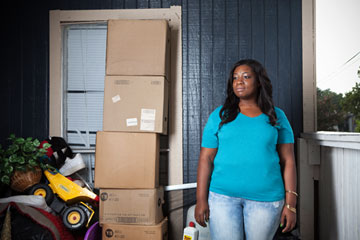
An uninsured single mother of two, Nicolette Cooksey is one of nearly 2 million Texans who would have been covered under the Affordable Care Act if the state had opted to expand Medicaid.
(2 of 4)
When the ACA was written, a cornerstone of the measure was a massive expansion of Medicaid, the government-run insurance program for the poor. But the Supreme Court ruled in 2012 that states aren't required to play along, and 26 have declined to do so, rejecting federal money to expand their Medicaid rolls. As a result, some 7 million people in those states will be denied coverage. Cooksey is one of the 1.7 million of them who live in Texas, which has the highest rate of uninsured residents in the nation. Says Genevieve Kenney, a senior fellow at the Urban Institute: "If these states--especially large ones like Texas, Florida, Georgia and North Carolina--don't expand Medicaid to more adults, it will leave a significant hole in the national insured picture."
Meanwhile, the success of the exchanges depends on the raw numbers: The White House has said all year long that it hopes 7 million to 8 million Americans will sign up for new health insurance by the end of 2014, a number big enough to enable Obama's aides to point to higher insured rates, healthier outcomes and greater financial security for Americans who now face the possibility of bankruptcy if hit by unexpected injuries or illnesses.
But as the Administration hustles to boost enrollment, not just any enrollees will do. Obamacare cannot work without young, healthy adults--lots of them. The exchanges are basic marketplaces: premiums will be affordable for everyone only if enough young, healthy people sign up for coverage. The premiums paid by those who are basically well help offset the cost of insuring older and sicker enrollees. Without younger people to dilute the risk, costs could eventually spiral out of control.
The White House has said young people must constitute about one-third of those enrolled through the exchanges to prevent this spiral. That may not seem like a lot, but it is. Many young people, burdened by college debt and confident about their invulnerability, may be less inclined to sign up for coverage. "The first people to show up are not going to be young, healthy people," says Timothy Jost, a law professor at Washington and Lee University and an expert on the ACA. "They will be older people and people with health problems." And those are the most expensive to insure.
"A Criminal Act"
It is not a coincidence that the marathon speech meant to defund the Affordable Care Act was delivered by a Texas Republican. Senator Ted Cruz's 21-hour sermon on the danger of Obamacare was just the latest broadside against the law from Lone Star State lawmakers. Under Governor Rick Perry and the Republican-controlled state legislature, Texas has opted out of nearly every aspect of the law it is legally allowed to.
In addition to not expanding Medicaid, the state has declined to set up its own insurance exchange, ceding the task to the federal government. The Texas department of insurance says it will not enforce ACA regulations, like those requiring insurers to cover pre-existing conditions. In September, Perry called for a law limiting the role of navigators, and the day enrollment began, he called the ACA "a criminal act." Unlike the robust public-service campaigns in some states that support the law, in Texas, ACA information is not even available on the state's official website.
